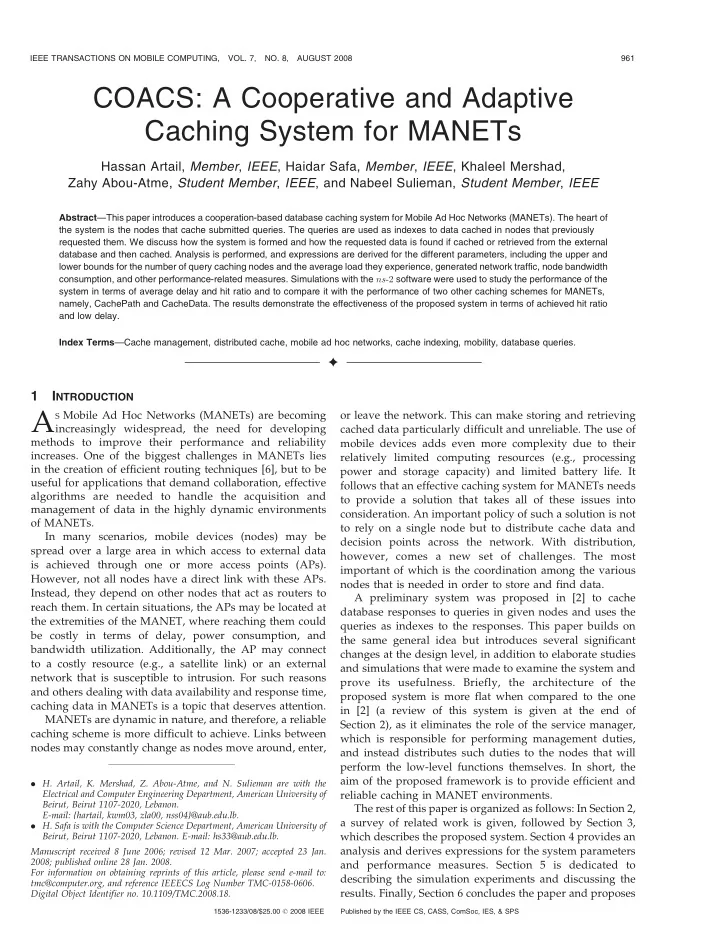

IEEE TRANSACTIONS ON MOBILE COMPUTING, VOL. 7, NO. 8, AUGUST 2008 961 COACS: A Cooperative and Adaptive Caching System for MANETs Hassan Artail, Member , IEEE , Haidar Safa, Member , IEEE , Khaleel Mershad, Zahy Abou-Atme, Student Member , IEEE , and Nabeel Sulieman, Student Member , IEEE Abstract —This paper introduces a cooperation-based database caching system for Mobile Ad Hoc Networks (MANETs). The heart of the system is the nodes that cache submitted queries. The queries are used as indexes to data cached in nodes that previously requested them. We discuss how the system is formed and how the requested data is found if cached or retrieved from the external database and then cached. Analysis is performed, and expressions are derived for the different parameters, including the upper and lower bounds for the number of query caching nodes and the average load they experience, generated network traffic, node bandwidth consumption, and other performance-related measures. Simulations with the ns -2 software were used to study the performance of the system in terms of average delay and hit ratio and to compare it with the performance of two other caching schemes for MANETs, namely, CachePath and CacheData. The results demonstrate the effectiveness of the proposed system in terms of achieved hit ratio and low delay. Index Terms —Cache management, distributed cache, mobile ad hoc networks, cache indexing, mobility, database queries. Ç 1 I NTRODUCTION A S Mobile Ad Hoc Networks (MANETs) are becoming or leave the network. This can make storing and retrieving increasingly widespread, the need for developing cached data particularly difficult and unreliable. The use of methods to improve their performance and reliability mobile devices adds even more complexity due to their increases. One of the biggest challenges in MANETs lies relatively limited computing resources (e.g., processing in the creation of efficient routing techniques [6], but to be power and storage capacity) and limited battery life. It useful for applications that demand collaboration, effective follows that an effective caching system for MANETs needs algorithms are needed to handle the acquisition and to provide a solution that takes all of these issues into management of data in the highly dynamic environments consideration. An important policy of such a solution is not of MANETs. to rely on a single node but to distribute cache data and In many scenarios, mobile devices (nodes) may be decision points across the network. With distribution, spread over a large area in which access to external data however, comes a new set of challenges. The most is achieved through one or more access points (APs). important of which is the coordination among the various However, not all nodes have a direct link with these APs. nodes that is needed in order to store and find data. Instead, they depend on other nodes that act as routers to A preliminary system was proposed in [2] to cache reach them. In certain situations, the APs may be located at database responses to queries in given nodes and uses the the extremities of the MANET, where reaching them could queries as indexes to the responses. This paper builds on be costly in terms of delay, power consumption, and the same general idea but introduces several significant bandwidth utilization. Additionally, the AP may connect changes at the design level, in addition to elaborate studies to a costly resource (e.g., a satellite link) or an external and simulations that were made to examine the system and network that is susceptible to intrusion. For such reasons prove its usefulness. Briefly, the architecture of the and others dealing with data availability and response time, proposed system is more flat when compared to the one caching data in MANETs is a topic that deserves attention. in [2] (a review of this system is given at the end of MANETs are dynamic in nature, and therefore, a reliable Section 2), as it eliminates the role of the service manager, caching scheme is more difficult to achieve. Links between which is responsible for performing management duties, nodes may constantly change as nodes move around, enter, and instead distributes such duties to the nodes that will perform the low-level functions themselves. In short, the aim of the proposed framework is to provide efficient and . H. Artail, K. Mershad, Z. Abou-Atme, and N. Sulieman are with the Electrical and Computer Engineering Department, American University of reliable caching in MANET environments. Beirut, Beirut 1107-2020, Lebanon. The rest of this paper is organized as follows: In Section 2, E-mail: {hartail, kwm03, zla00, nss04}@aub.edu.lb. a survey of related work is given, followed by Section 3, . H. Safa is with the Computer Science Department, American University of Beirut, Beirut 1107-2020, Lebanon. E-mail: hs33@aub.edu.lb. which describes the proposed system. Section 4 provides an analysis and derives expressions for the system parameters Manuscript received 8 June 2006; revised 12 Mar. 2007; accepted 23 Jan. 2008; published online 28 Jan. 2008. and performance measures. Section 5 is dedicated to For information on obtaining reprints of this article, please send e-mail to: describing the simulation experiments and discussing the tmc@computer.org, and reference IEEECS Log Number TMC-0158-0606. results. Finally, Section 6 concludes the paper and proposes Digital Object Identifier no. 10.1109/TMC.2008.18. 1536-1233/08/$25.00 � 2008 IEEE Published by the IEEE CS, CASS, ComSoc, IES, & SPS
Recommend
More recommend